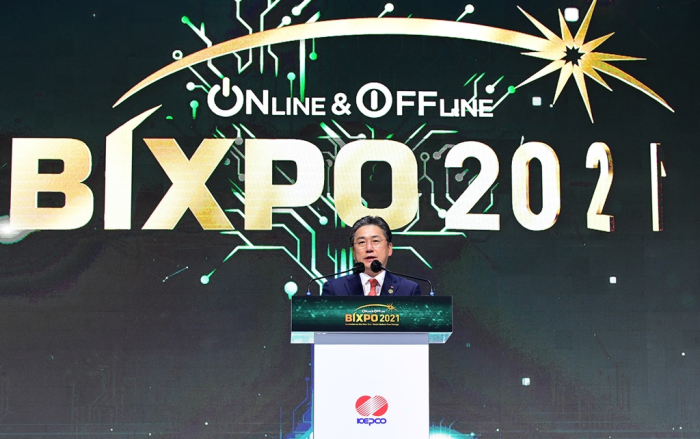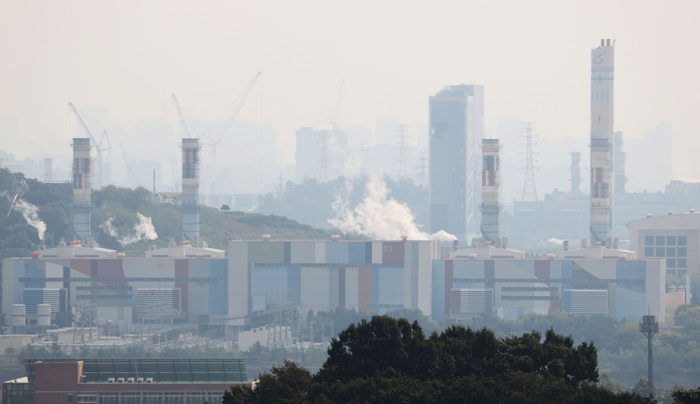Carbon neutrality
Korea’s state electric companies to cease coal power generation by 2050
To develop offshore wind farms and next-generation solar power production; raise hydrogen power generation
By Nov 11, 2021 (Gmt+09:00)
2
Min read
Most Read
LG Chem to sell water filter business to Glenwood PE for $692 million


Kyobo Life poised to buy Japan’s SBI Group-owned savings bank


KT&G eyes overseas M&A after rejecting activist fund's offer


StockX in merger talks with Naver’s online reseller Kream


Mirae Asset to be named Korea Post’s core real estate fund operator



State-run utility Korea Electric Power Corp. (KEPCO) and its six subsidiaries declared an aim to cease coal power generation by 2050 in a bid to play a key role in the country’s goal of reaching zero carbon emissions by then.
KEPCO and the subsidiaries – Korea Hydro & Nuclear Power Co., Korea South-East Power Co., Korea Midland Power Co., Korea Western Power Co., Korea Southern Power Co. and Korea East-West Power Co. – unveiled a blueprint for carbon neutrality, dubbed “ZERO for Green” on Nov. 10 at the Bitgaram International Exposition of Electric Power Technology 2021 held in Gwangju, South Korea.
“Carbon neutrality is a very difficult and challenging task. But it will be successfully achieved with global cooperation by combining capabilities and wisdom,” said KEPCO President and CEO Chung Seung-il in his opening speech at the exposition.
RENEWABLE ENERGY
Those state-run electric companies plan to use renewable energy sources to cut carbon emissions from power production to zero. They will cease coal power production by 2050 but develop renewable energy businesses such as large offshore wind farms and next-generation solar photovoltaic power production. They have committed to gradually increase their hydrogen power generation.
They are set to reinforce their power grids, invest more in energy storage systems and build up intelligent power supply systems as it becomes more and more important to supply energy in a stable and effective manner, given the increasing global push for renewable energy.
KEPCO and its subsidiaries will actively develop new technologies in the energy sector. They will reduce costs for offshore wind power generation by more than 40% with turbine enlargement and technologies for the construction of large wind farms. They will also increase green hydrogen production efficiency to more than than 80% by 2030 from the current 65%, utilizing water electrolysis technology. In a move to convert fuels, they aim to demonstrate mixed combustion with 20% ammonia by 2027 and develop technology on mixed combustion with 50% hydrogen by 2028.
To reduce emissions from power plants, carbon capture, utilization and storage (CCUS) will also be a focus, with a plan to commercialize CCUS technology at coal and liquefied natural gas plants.

Write to Ji-Hoon Lee at lizi@hankyung.com
Jongwoo Cheon edited this article.
More to Read
-
 Business & PoliticsTrump Jr. meets Korean business chiefs in back-to-back sessions
Business & PoliticsTrump Jr. meets Korean business chiefs in back-to-back sessionsApr 30, 2025 (Gmt+09:00)
-
 Korean chipmakersSamsung in talks to supply customized HBM4 to Nvidia, Broadcom, Google
Korean chipmakersSamsung in talks to supply customized HBM4 to Nvidia, Broadcom, GoogleApr 30, 2025 (Gmt+09:00)
-
 EnergyLS Cable breaks ground on $681 mn underwater cable plant in Chesapeake
EnergyLS Cable breaks ground on $681 mn underwater cable plant in ChesapeakeApr 29, 2025 (Gmt+09:00)
-
 Business & PoliticsUS tariffs add risk premium to dollar assets: Maurice Obstfeld
Business & PoliticsUS tariffs add risk premium to dollar assets: Maurice ObstfeldApr 29, 2025 (Gmt+09:00)
-

Comment 0
LOG IN


